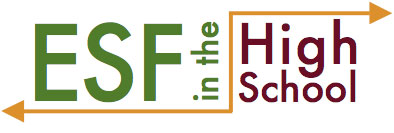SUNY ESF
ESF in the High School

Developing Students and Citizens
The ESF in the High School and ESF Science Corps programs help students prepare to be leaders in the stewardship of both our natural and designed environments, and to be effective citizens for the 21st century.
Environmental problems make headlines every day. Understanding the complex scientific and social issues behind these headlines, coupled with the ability to critically solve these problems, is a requirement in the work place today. This need not only applies to those in STEM fields but to everyone across the education spectrum.
What is ESF in the High School?
A school/college partnership program that enables qualified students to:
- Experience college-level course work while still in high school.
- Understand the complex scientific and social perspectives behind the environmental issues that make headlines every day such as, the relationship between energy use and the environment.
- Learn about and explore diverse interests and career opportunities in environmental science, engineering, management, policy and design - and in related areas such as law, communications, technology and medicine.
- ESF in the High School Brochure
- Active Schools in NY State
- Active Schools in Onondaga County
- FERPA: Family Educational Rights and Privacy Act
What courses are offered in ESF in the High School?
The flagship course is ESF's environmental science course, Global Environment (EFB120, 3 college credits). Key environmental science themes and critical thinking skills form the basis for classroom and experiential learning activities. Global Environment's interdisciplinary approach reflects our enduring belief that all students, regardless of their specific college and career paths, will benefit from an understanding of the linkages among human social systems and biophysical systems.
Students explore the relationships between their local rural, urban, and suburban communities and the broad global context of environmental change. Opportunities abound for including course topics based on available local and regional resources as well as teacher interests, expertise, and experiences. Ultimately, we seek to develop students and citizens who have a solid understanding of science and a sense of wonder and appreciation for the Earth as a system.
Other courses include:
- Writing and the Environment (EWP190, 3 credits)
- Ecology and the Economic Process (ESF122, 3 credits)
- Introduction to Renewable Energy (FCH296, 3 credits)
- General Biology 1 (EFB101 & 102, 4 credits)
- General Biology 2 (EFB103 & 104, 4 credits)
Credits and Grades:
- Credits and grades earned are recorded as part of each student's permanent college academic record which can be transferred to other college and universities throughout the U.S. Official transcripts that indicate that the courses completed are college-level courses with college credit, are available through the ESF Registrars' office. While acceptance at other colleges and universities is not and cannot be guaranteed, credits earned with grades of C or higher typically can be applied to undergraduate degree requirements at many colleges and universities.
Who are the ESF in the High School Teachers?
ESF in the High School Teachers are qualified high school teachers who must earn an appointment as an ESF Adjunct Instructor. They teach their ESF in the High School course in their school as part of the high school schedule. Teachers participate in mentoring and professional development relationships with ESF faculty and educational specialists, and with other ESF in the High School teachers. Participating teachers and students form learning communities through which they share information, teaching/learning experiences, and related ideas and materials. Each participating teacher receives:
- Mentoring, course preparation, and consultation with College faculty and staff throughout the academic year.
- Professional Development opportunities specifically designed for - and with ESF in the High School teachers. In addition, adjunct instructors may participate in other ESF faculty professional development programs.
- Onsite and offsite use and borrowing privileges at the ESF library.
- Parking privileges on the ESF campus.
How do I register for ESF in the High School?
Students must contact their high school teacher for the an online registration link.
- Contact Maura H. Stefl, mhstefl@esf.edu
How much does it cost?
Student costs are based on the number of college credits taken. The basic program fee is $200 per 3 credit course. Students who are eligible for the Federal Free and Reduced School Lunch program will pay a discounted program fee of $75 per 3 credit course. Students must provide official proof from their school district regarding their eligibility. Prorated fees exist for courses with other credit values. Registration will be done online using a link provided by the student's instructor. Payment can be made via credit card online or by personal check or money order payble to SUNY ESF.
If a student participates in ESF in the High School Courses can they be admitted to ESF as a college student?
Freshman admission to ESF is highly selective, with the College normally admitting approximately 45% of high school seniors who apply for admission. Completion of an ESF in the High School course with a grade of "B" or higher has been shown to significantly increase the chance that an applicant will be offered admission. The College's Admission Committee views high grades earned in an ESF in the High School course as an indication of the student's ability to succeed in ESF's rigorous academic programs. Merit and Need-Based scholarships are available for accepted students.
